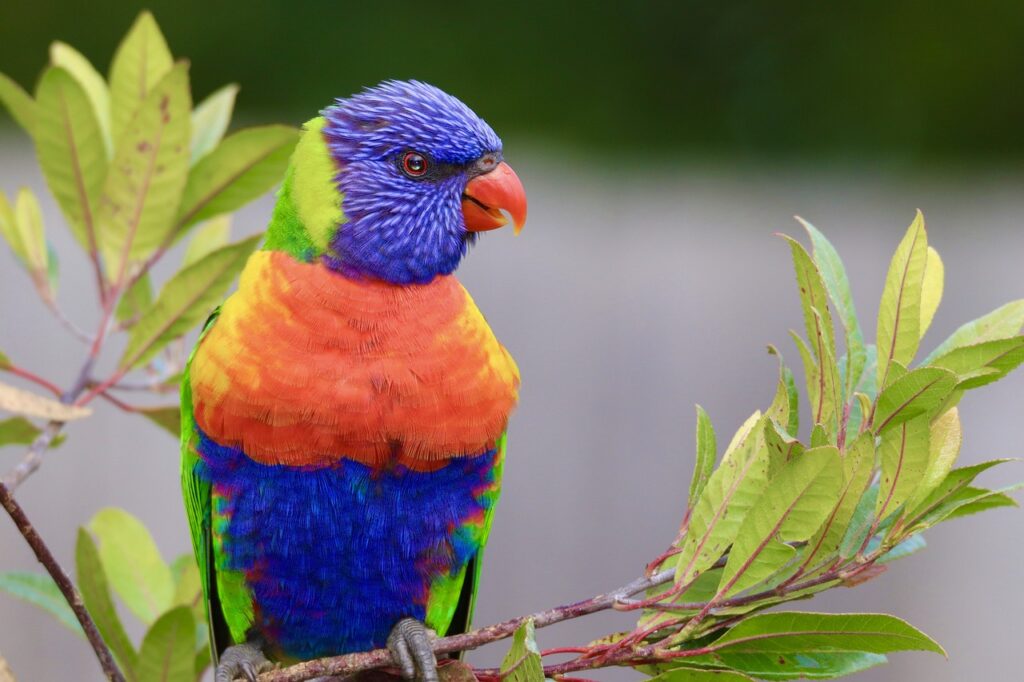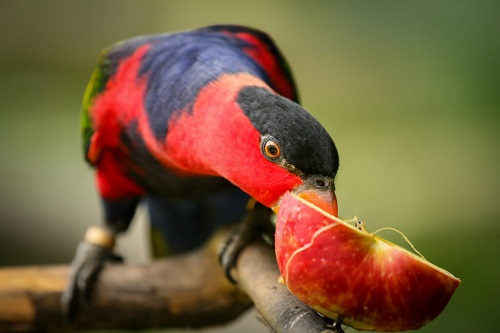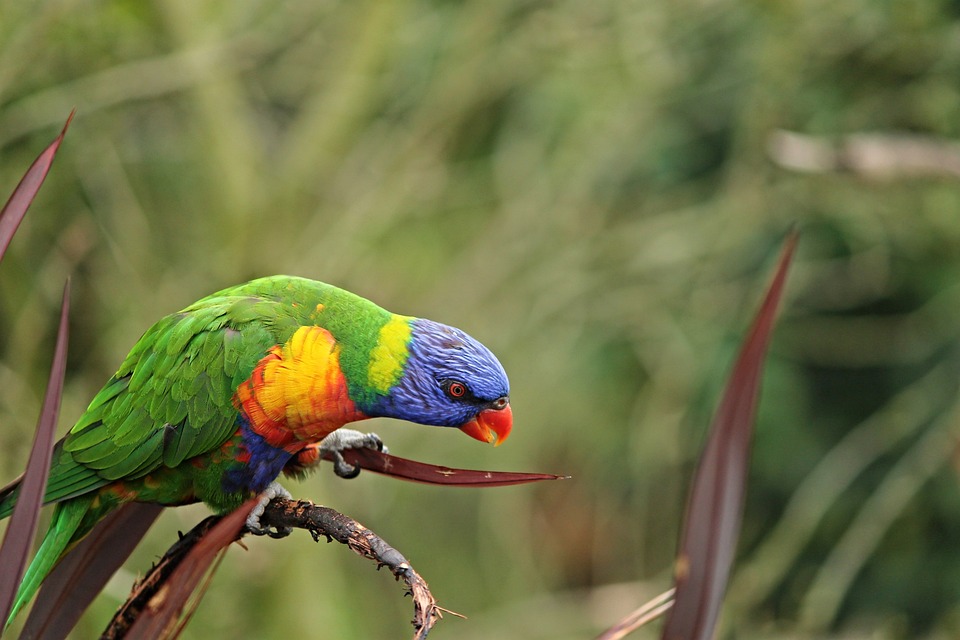Apples are a ubiquitous fruit, a delightful crunch enjoyed by people around the world. It’s natural to wonder if your feathered friend can partake in this tasty treat. The answer is yes, parrots can indeed enjoy apples, but with some important considerations. This in-depth guide will explore the benefits of incorporating apples into your parrot’s diet, alongside crucial information on safe preparation and serving.
Can Parrots Eat Apples?
Absolutely! Apples are a safe and healthy treat for most parrots. They offer a delightful combination of sweetness, crunch, and essential nutrients that can complement your parrot’s balanced diet
Benefits of Apples for Parrots
Apples offer a treasure trove of advantages for your parrot’s health and well-being:
- Rich in Vitamins and Minerals: Apples are a good source of vitamin A, essential for maintaining sharp vision and a robust immune system. They also boast vitamin C, which aids parrots in absorbing iron and fighting off infections.
- Helps with Hydration: With a water content hovering around 85%, apples play a vital role in keeping your parrot hydrated, especially during hot and dry spells. This is particularly important as parrots lose moisture through respiration.
- Rich in Fiber: Apples are a good source of dietary fiber, promoting healthy digestion and gut health. Fiber helps regulate the digestive system, preventing constipation and promoting the growth of beneficial bacteria.
- Good Antioxidant: Apples are armed with antioxidants that combat free radicals, harmful molecules that damage cells and contribute to chronic diseases. These antioxidants can potentially reduce the risk of age-related health problems in parrots.
- Nutrition Enrichment: Apples provide more than just a nutritious snack; they offer mental stimulation and enrichment. The process of shredding and consuming the apple engages your parrot’s natural foraging instincts, keeping them mentally occupied and preventing boredom.

Essential Considerations When Sharing Apples with Your Parrot
While apples are generally safe for parrots, there are a few key factors to keep in mind:
- Seeds: Apple seeds contain amygdalin, a compound that converts to cyanide in the digestive system. Cyanide is toxic to parrots, even in small amounts. Always remove the seeds and core completely before offering apple slices to your feathered companion.
- Peeling: Apple peels may harbor traces of pesticides, posing a potential health risk. To minimize this risk, thoroughly wash apples under running water before serving them to your parrot. If you’re unsure about the origin of the apple, it’s best to remove the peel altogether. Opting for organic apples whenever possible can further reduce pesticide concerns.
- Sugar: Apples contain natural sugars, which are not inherently harmful in moderation. However, excessive sugar intake can lead to weight gain and other health problems in parrots. Limit the amount of apple you offer your parrot and ensure their diet primarily consists of formulated parrot food.
- Choking Caution: Parrots, especially smaller species, can choke on large pieces of fruit. To prevent this hazard, cut apples into small, bite-sized pieces that are appropriate for your parrot’s size.
- Variety is the Spice of Life: While apples are a healthy treat, don’t let them become the sole fruit in your parrot’s diet. Offer a diverse selection of fruits and vegetables to ensure your parrot receives a well-rounded spectrum of nutrients.
How Often Should You Feed Apples to Your Parrot?
Apples should be considered a delightful treat, not a staple food source. A good rule of thumb is to offer them no more than 2-3 times a week, in limited quantities. This allows your parrot to reap the benefits of apples without the drawbacks of excessive sugar consumption.
How to Prepare Apples for your Parrot
Here’s a step-by-step guide on ensuring your apple slices are safe and enjoyable for your feathered friend:
- Washing: Wash the apple meticulously under running water to remove any surface dirt, debris, or pesticide residues.
- Seed and Core Removal: Use a sharp knife to meticulously remove the core and seeds. Discard these parts as they are not safe for parrots.
- Bite-Sized Chopping: Cut the apple flesh into small pieces that are appropriate for your parrot’s size. Larger parrots can handle larger chunks, while smaller birds require very thin slices. Consider their beak size and adjust accordingly.
- Organic Option: Opt for organic apples whenever possible to minimize the risk of pesticide residues on the peel, especially if you choose to leave it on.
- A Rainbow of Choices: Don’t just stick to red apples! Explore other colors like green or yellow for a change of pace and to provide additional nutrients. Different colored apples offer variations in vitamins, antioxidants, and fiber content.
Can Baby Parrots Enjoy Apples?
Generally, it’s best to wait until your baby parrot is fully weaned before introducing apples or any new foods. Their digestive systems are still developing and may not be able to handle the complex fibers in apples. Consult your avian veterinarian for personalized

A World Beyond Apples: Exploring Other Parrot-Safe Foods
Parrots are omnivores, meaning they thrive on a diet that incorporates both plant-based and animal-based foods. While apples can be a delightful addition to their menu, it’s important to offer a broader variety to ensure they receive a well-balanced nutritional profile. Here’s a glimpse into the exciting world of parrot-safe foods you can explore:
Fruits:
- Tropical Treats: Mango, papaya, and banana offer a burst of sweetness and essential vitamins like A and C. Remember to remove pits and seeds where applicable.
- Berry Bonanza: Blueberries, raspberries, and strawberries are a treasure trove of antioxidants and vitamins. Their small size makes them perfect for smaller parrot species.
- Pear Paradise: Pears provide a similar nutritional profile to apples but with a softer texture, potentially easier for younger parrots to manage.
- Melon Marvels: Watermelon, cantaloupe, and honeydew melons offer a refreshing and hydrating treat, especially during hot weather. However, limit their intake due to their high water content.
Vegetables:
- Broccoli Power: Rich in vitamins C and K, broccoli florets provide essential nutrients and a fun, crunchy texture for parrots.
- Carrot Capers: Carrots are a good source of beta-carotene, which converts to vitamin A in a parrot’s body. Offer them raw, cooked, or shredded.
- Sweet Potato Surprise: Sweet potatoes are another excellent source of beta-carotene and offer a slightly sweeter alternative to carrots.
- Green Bean Goodness: Green beans are packed with fiber and essential vitamins. Chop them into manageable pieces before offering them to your parrot.
- Leafy Green Delights: Leafy greens like kale, spinach, and collard greens are a powerhouse of vitamins and minerals. However, offer them in moderation due to their oxalic acid content, which can interfere with calcium absorption.
Nuts and Seeds (in small quantities):
- Walnut Wonders: Walnuts provide healthy fats and omega-3 fatty acids, beneficial for a parrot’s heart and feather health. However, limit their intake due to their high-fat content.
- Almond Appetizers: Almonds are another source of healthy fats but should be offered sparingly due to their choking hazard potential and cyanide content. Opt for slivered or chopped almonds for easier consumption.
- Chopped Peanut Perks: Chopped peanuts can be a delightful occasional treat for parrots, offering protein and healthy fats. However, be mindful of the risk of aflatoxins, a toxin produced by mold on peanuts. Purchase peanuts from reputable sources and avoid giving them if they appear moldy.
Grains (in moderation):
- Cooked Brown Rice Bonanza: Cooked brown rice provides a complex carbohydrate source, offering sustained energy for your parrot.
- Quinoa Delights: Quinoa is a complete protein grain, meaning it contains all nine essential amino acids that parrots cannot synthesize on their own. However, cook it thoroughly before offering it to your parrot.
- Sprouted Grain Surprises: Sprouted grains like wheat berries or barley offer a concentrated source of nutrients due to the sprouting process. Introduce them gradually as some parrots may find them difficult to digest.
Always the Star of the Show: Commercial Pellets
It’s crucial to remember that despite the vast array of delicious and nutritious treats you can offer your parrot, high-quality formulated parrot pellets should be the foundation of their diet. These pellets are designed to provide all the essential vitamins, minerals, and nutrients your parrot needs to thrive.

Crafting a Balanced Parrot Diet: A Recipe for Success
Providing your parrot with a balanced and varied diet is paramount for their overall health and well-being. Here are some key strategies to create a well-rounded dietary plan:
- Variety is Key: As mentioned earlier, avoid making apples or any single food the mainstay of your parrot’s diet. Offer a vibrant mix of fruits, vegetables, and formulated pellets throughout the week to ensure they receive a comprehensive spectrum of nutrients.
- Portion Patrol: Even healthy foods can be problematic in excess. Use a feeding guide specific to your parrot’s size and species to determine appropriate portion sizes. Overfeeding can lead to obesity and other health problems.
- Fresh is Best: While frozen or dehydrated options can be convenient, prioritize offering fresh fruits and vegetables whenever possible. Fresh produce retains more nutrients and provides a more stimulating feeding experience for your parrot.
- Introducing New Foods with Care: Don’t overwhelm your parrot’s digestive system with a sudden influx of new foods. Introduce new items one at a time, monitoring for any adverse reactions like vomiting or diarrhea. If you notice any negative reactions, discontinue offering that particular food and consult your avian veterinarian.
- Transform Mealtime into an Adventure: Presentation matters! Scatter chopped fruits and vegetables around the cage or forage toys to encourage your parrot to explore and search for their food. This mimics natural foraging behavior and provides mental enrichment, keeping your feathered friend engaged and stimulated.
- Respecting Preferences: Parrots, like us, have individual preferences. Some may adore apples and broccoli florets, while others might turn their beaks up at these offerings. Be patient and offer a variety of options to discover what your parrot enjoys. Don’t force them to eat anything they dislike.
- Consulting an Avian Veterinarian: Avian veterinarians are experts in parrot health and nutrition. They can provide personalized dietary advice based on your parrot’s age, species, activity level, and any specific health concerns. Regular checkups with your avian veterinarian are vital for ensuring your parrot receives the proper care and diet for a long and healthy life.
The Final Verdict
Apples can be a wonderful addition to your parrot’s diet, offering essential vitamins, hydration, and mental stimulation. However, remember, moderation is key. Apples should be a treat, not a dietary staple. By prioritizing a balanced diet rich in a variety of fruits, vegetables, high-quality formulated pellets, and occasional treats like apples, you can ensure your feathered friend thrives for many years to come. Observing your parrot’s eating habits and droppings can also provide valuable insights into their health. Consistent droppings and a healthy appetite are generally good signs.
Additional Tips:
- Food Journal: Maintain a food journal to track what your parrot eats and how much. This can be helpful when discussing diet with your avian veterinarian and allows you to identify any patterns or preferences.
- Fresh Food Management: Be mindful of uneaten food in the cage. Discard and replace spoiled items promptly to prevent bacterial growth and potential health issues for your parrot.
- Droppings as Indicators: Observe your parrot’s droppings. Any significant changes in consistency or color could indicate a dietary issue or underlying health problem. If you notice any concerning changes, consult your avian veterinarian promptly.
By following these guidelines and consulting your avian veterinarian, you can ensure your parrot enjoys a healthy and enriching diet that includes the occasional delicious apple treat. Remember, a happy and healthy parrot is a chatty and playful parrot, bringing joy to your life for years to come.

